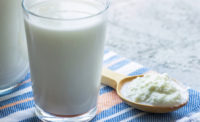Dairy vital for pregnant women and child’s development
Milk, cheese and yogurt products crucial for brain and bone development, research finds.

Photo courtesy of mescioglu on www.gettyimages.com

There is no more critical time than the first 1,000 days of a child’s life to set a strong foundation for their overall cognition and brain development.
This thousand-day window begins at conception and goes to a child’s second birthday, and it is greatly influenced by dietary choices, including how well a mother eats during pregnancy.
Dairy consumption plays a key role for expecting mothers thanks to milk’s package of 13 essential nutrients. In fact, an American Academy of Pediatrics policy statement recognizes 14 nutrients that are important for early brain development, and milk, cheese, and yogurt provide seven — protein, vitamins A and B12, zinc, selenium, and two lesser-touted contributions: iodine and choline.
Iodine is an especially critical nutrient for bone and brain development during pregnancy and infancy, making this a particularly relevant focus for women of childbearing age. However, the most recent Dietary Guidelines Advisory Committee noted that iodine insufficiency is reappearing in some population groups and women of reproductive age are at high risk of inadequacy for iodine if they follow restrictive diets. Severe iodine deficiency is linked to higher risks for miscarriage and perinatal and infant mortality.
Milk, cheese, and yogurt are important sources of iodine and a recent NHANES study led and funded by National Dairy Council showed that higher levels of dairy food intake are linked to improved iodine status across all ages and racial/ethnic groups. As more young women opt for plant-based alternatives, which do not typically provide iodine, this study offers an important reminder of dairy’s unique role in supporting good health, from pregnancy through adulthood.
Choline also is known for its cognition benefits and while the liver produces small amounts of it, the rest must be obtained through the diet. Milk contributes about 8% of the daily value for choline per 8-ounce serving. Yet, research shows 92% of pregnant women consume below the adequate intake levels for choline.
It’s important the emphasis on nutrition and dairy consumption continue once the child is born. At around six months of age, cheese, and yogurt are easy ways to familiarize babies to new tastes and textures. After the baby’s first birthday, as they transition from breast milk or iron-fortified formula, whole milk and other dairy foods emerge as sources of calories, high-quality protein and other nutrients.
Experts at the American Academy of Pediatrics, the Academy of Nutrition and Dietetics, the American Academy of Pediatric Dentistry, and the American Heart Association recommend dairy milk and water as the go-to beverages for children 1 to 5 years of age.
Expecting and new parents understandably have plenty to think about. Remembering the basics of nutrition, including dairy consumption, is a wise investment of time to help nourish a lifetime of cognitive wellness.
Looking for a reprint of this article?
From high-res PDFs to custom plaques, order your copy today!






